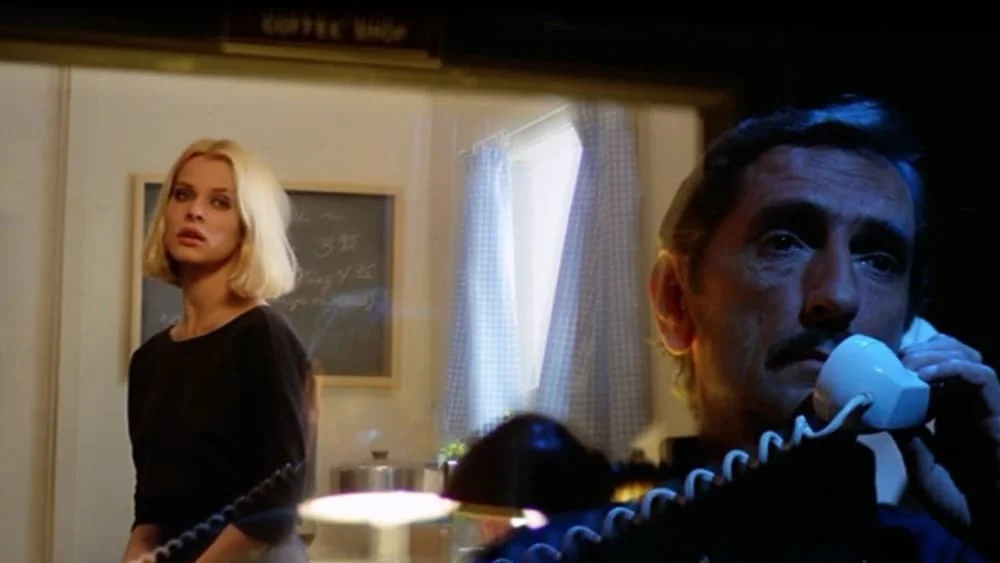A man walks into a peep show in a dilapidated part of 1980s Houston, Texas. His son, with whom he has only just reunited, waits behind in the car as he tries to find and reconnect with his estranged wife after years of lonely wandering. He isn’t sure how to contact her once he’s there — he doesn’t even know for certain if it was her car he followed to get there — but he tries anyway. The only way to find her is to ask for different women to come into the one-way viewing booth until she appears. When he finally finds her, he can barely bring himself to speak. He doesn’t reveal himself and leaves with their son, the closure too painful. It is deeply moving, and a clever use of setting. The one-way mirror instantly becomes an iconic cinematic set piece.
But then the film keeps going. The man leaves his son for good and returns to the peep show to finally bare his soul to the love of his life. The unique one-way mirror set piece is used again, now feeling like a retread of the scene we’ve already seen. While the dialogue in the previous scene was sparse — the woman reaches out to the speechless man, silence and contemplation fill the space — suddenly the characters launch into dense, verbose monologues. Unnecessary backstory spews from their mouths for what seems like an eternity. The woman is reunited with her son, the man returns to the cold, lonely world à la John Wayne in “The Searchers.” There is no happy ending, but there is a resolution.
This is how director Wim Wenders and writer Sam Shepard end their 1984 near-masterpiece “Paris, Texas.” I say near because this ending provoked such hatred in me that, as brilliant as most of the film is, the final 30 minutes nearly tank the whole endeavor. For the 40th anniversary of its Palme d’Or win at the Cannes Film Festival, I watched the film for the first time. I was somewhat familiar going in — as a cinephile, you always are with famous older films you haven’t seen — plus many of the works it influenced. In the past 40 years, it has cemented itself as a canonical text and one of the best films of its era. For people who love it, it seems the film’s ending is one of the primary drivers of their affection. But to me, it feels so radically different from the rest of the film emotionally and thematically that it fails to stick the landing.
My problem with the ending stems from how it alters how we perceive Travis’s loneliness and isolation. To this point in the film, “Paris, Texas” is in conversation with a lot of tropes associated with the Western genre — the vast, desolate landscapes that the loner protagonist sees as a source of freedom; the quiet outsider who is only looking out for himself until he finds a community that accepts him; the desire to get the girl — and while it is more meandering road movie than Western, those genre tropes are critical to the audience finding meaning in what is otherwise a sparse, mysterious story. Travis’s plot of empty land in Paris may be a last attempt at understanding his deceased parents, but it represents the loneliness and isolation of the frontier calling to him. He is trying desperately to return to his wife and son and be the normal family they could’ve been, but he can’t. He’s a coward, and his remorse for the evil things he did to her never appears like issues he can put behind him. Having him overcome his shame and reveal himself to Jane, only for Travis to drive off into the sunset (probably to his lot in Paris) anyway strips any subtextual meaning from that empty land, instead turning it into something that is brought up at the beginning of the film, attempted to explain, and then not addressed again. If you’re going to go with the “he should be alone” ending anyway, it’s much more devastating if Travis doesn’t get the redemption he craves.
A film can still be successful even if portions muddle its ideas. Sometimes that messiness can be the reason for a film’s greatness. But the emotional core needs to stay intact, and the finale of “Paris, Texas” takes a wild departure from the rest of the film. If you end after Travis leaves the peep show the first time, you have an ending that plays better with the unsatisfactory reunions and reconciliations between Travis and his brother and son. Wenders and Shepard don’t want a happy ending, so Travis and Jane still don’t end up back together at the end. Yet they demand closure, and they get that in the form of regretful catharsis. It’s melodrama in a film that hasn’t been melodramatic for its entire runtime up to that point. It’s maddening to think they felt the need to reach for something grander at the last possible moment when an underwhelming, downbeat ending is exactly what the film needs.
My 40-year-late opinion on the ending of a beloved film that has already been immortalized isn’t changing anyone’s mind. But I still can’t wrap my head around why people who love this movie don’t seem to take issue with the final sequence. It completely changes the point of the film. Maybe people like the film that it becomes after the final 30 minutes. It’s certainly a more earnest and less cynical ending, but it isn’t as powerful as it could be. If you’re going to be tragic, be tragic. If you’re going to have a story of redemption, go all the way with it and say that this man deserves to be forgiven. The ending tries to have it both ways, making the film’s ideas unclear.

